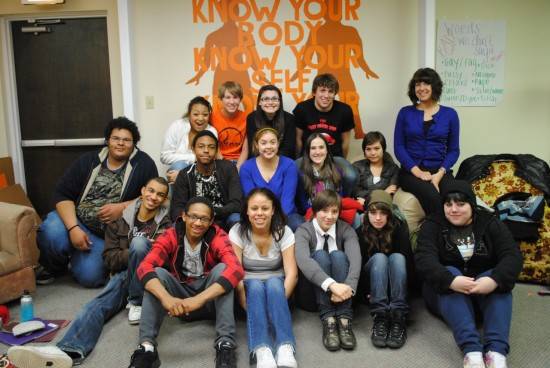 February 14–21 is National Condom Week, and while educating your child about the use and effectiveness of condoms around Valentine’s Day might seem scary or inappropriate, recent research suggests many parents are long overdue in addressing safer sex with their teens. The Centers for Disease Control and Prevention (CDC) estimates that nearly 19 million new sexually transmitted infections occur every year, with 15 to 24 year-olds making up half of these cases. Even more alarming, the heaviest Chlamydia and gonorrhea burdens are among adolescent girls aged 15–19. Additionally, Illinois ranks 18 out of all states for teen birth rates, according to the Illinois Department of Public Health.
February 14–21 is National Condom Week, and while educating your child about the use and effectiveness of condoms around Valentine’s Day might seem scary or inappropriate, recent research suggests many parents are long overdue in addressing safer sex with their teens. The Centers for Disease Control and Prevention (CDC) estimates that nearly 19 million new sexually transmitted infections occur every year, with 15 to 24 year-olds making up half of these cases. Even more alarming, the heaviest Chlamydia and gonorrhea burdens are among adolescent girls aged 15–19. Additionally, Illinois ranks 18 out of all states for teen birth rates, according to the Illinois Department of Public Health.
Peer Educators from Planned Parenthood of Illinois’ Teen Awareness Group (TAG) have collaborated to provide real-life tips for parents who want to develop more effective ways to approach their teens about topics like relationships, sex, and protection. For more information about TAG, visit www.ppil.org.
Openness starts early!
It is very important when communicating with your child about sex to ensure that you have already established an open relationship with them. Healthy communication is something that must be worked at often, and over time. If you have not yet established this kind of relationship with your child, it is best to start out simple. Activities such as taking your child out for ice cream or doing the dishes together can help strengthen your relationship and show them you are dedicated to being available to them. This will help you understand a bit more about your child, and eventually find the right timing to bring up important issues like peer pressure, body image, relationships and sex.
Close parental relationships are important for sexual health!
Parents need to build a growing relationship with their children as they become teens and then adults. If teenagers feel comfortable around their parents, they are more likely to come to them when there is a problem. Yes, teens often feel more comfortable talking to friends, but others our age don’t always have the correct information. Parental knowledge and ability to answer uncomfortable questions is important. Teens want to know that if something goes wrong, their parent can help address the problem without judgment or punishment. If we are fearful of a parent’s reaction, or feel like they wouldn’t want to answer our questions, we might go to a less reliable source for information, leading to possible negative outcomes for our health.
Share family values, but don’t force them!
When talking to your child about sex and sexuality, it’s important to state your family values, but be careful not to force them upon your child. Remember that your child is an individual, and although you love your child, (s)he has to make his/her own decisions. It’s important to be at a level of understanding with your child and not push your values too hard on him/her without checking to see where (s)he stands. Ideally, a parent could explain the family’s values to their child, while also asking questions about the child’s own values. Working together to establish clear expectations on behaviors, and why those are important to the family dynamic can help teens and parents avoid tension in their relationships.
It’s not a one-stop talk!
When talking with teens about sex, it helps to keep the lines of communication open. Sex can be a sensitive topic for both teens and parents, so talking about it shouldn’t be a one-time occurrence. While you may want to make every point and dispel every myth in one sitting, this information can be overwhelming and even scary. Asking questions and validating your teen’s feelings and concerns is sometimes more important than the wealth of knowledge you have to offer. Telling us that our questions are normal lifts a weight off our shoulders and allows for further communication between teens and parents. In turn, this allows you to teach us lessons at a pace comfortable for everyone. While you can’t follow us around every time we go on a date, the general level of knowledge that comes from a healthy parent-child relationship will influence us even when we are beyond your guard.
In the dark? That’s okay!
Even parents can feel uncomfortable when their child asks a difficult question about sex. Maybe you feel awkward, or perhaps you actually don’t know the answer yourself. If this happens just say, “Let’s make time and look this up together,” or actually get on the Internet and find answers right that minute. Don’t make up false information just to give them an answer. If you lie, your teen will find out about your dishonesty and will not come to you with future questions, making you lose control of where they seek information. Even worse, false information can drastically impact your teen’s health and continue the perpetuation of myths.
Provide reliable resources!
Teens get their information from a variety of sources, so it is great that you will be a resource for reliable information. It is important that your teen knows where to get reliable information if you are not available to talk to or if they do not feel comfortable bringing every issue to you. No matter how open your relationship with your teen is, there may be questions that they do not feel comfortable asking you. We recommend you combine these resources with encouragement that they can come to you with questions. Information about sex is everywhere, but misinformation is just as easy to find, so it is important that your teen learns to distinguish between accurate sources and unreliable sources. There are plenty of age-appropriate resources in the forms of books or websites; one of our personal favorites for teens is www.teenwire.com. If you need more help with your own familiarity with updated information, visit www.plannedparenthood.org/parents.
Understanding trumps punishment!
Shock and anger are two emotions that can naturally arise when talking with your kids about sex. During some situations it can be the very first time a parent finds out that their child is sexually active. Parents may feel their trust has been betrayed and punish the child for their behavior. However, this reaction can lead to an environment and relationship that is not conducive to the open exchange of information. Checking in with your own emotions before sitting down to talk with your child can help you remain calm. Instead of letting your own emotions dictate the conversation, relax and congratulate yourself that you have just established a very open line of communication with your child. It takes a lot of courage for the both of you to sit down and discuss touchy topics like sex and protection. Your child will appreciate your effort and your willingness to hear them out without fear of punishment. Now take a deep breath, ask a few questions, and listen to what is going on in his/her life!
— TAG Peer Educators: Alexx (17), Brandy (17), Camilla (17), Cheyenne (16), Cody (17), Erica (16), Jade (16), Jerrin (16), Kaitlyn (17), Kendall (18), Kenny (16), Maura (18), Mike (17), Monique (16), Rachel (18), Savara (18), Zac (17), Lena Hann, MPH, CHES, Education Programs Coordinator (Ageless)









